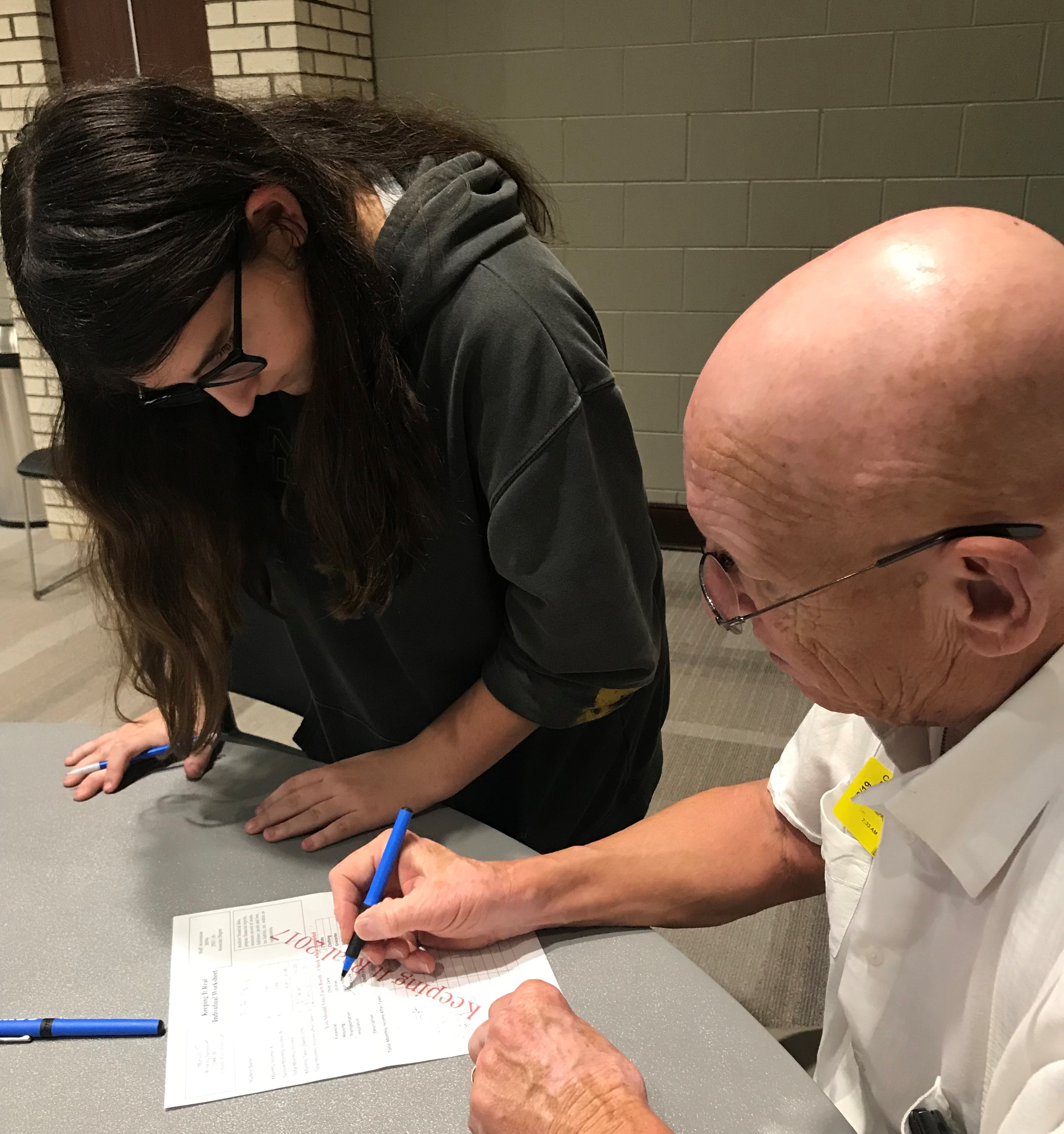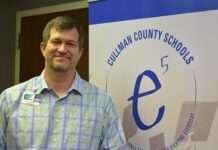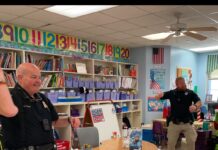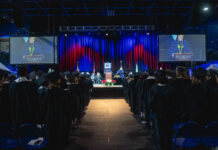Cullman High School ninth-grader BriAnn Payne, left, works with volunteer Michael Burchett during this week’s “Keeping It Real” program at the school. The program is put on by Cullman Area Workforce Solutions. (Christy Perry for The Cullman Tribune)
CULLMAN – The Cullman Economic Development Agency’s (CEDA’s) workforce entity, Cullman Area Workforce Solutions (CAWS), brought its “Keeping It Real” program to Cullman High School this week.
Ninth-grade students were given an opportunity to look into life after high school during the two-day program. Students were given mock scenarios as they navigated the ups and downs of being a working adult.
Keeping It Real, according to CAWS, “gives area ninth-graders ‘real-world experience’ in paying household bills and making financial decisions for their ‘mock’ family. During the program, students, who are assigned a family, job and income, visit 12 booths where they purchase everything from groceries to daycare. The students learn the value (of) budgeting and making sound decisions when faced with unexpected expenses.”
Each student was given a random mock career. They were given salaries, different levels of education, spouses and children. Some had working spouses while others had spouses who stayed home.
Belinda Hyatt, director of the Keeping It Real program, said, “The students basically come in and budget and pay bills to get an idea of what they will experience in the real world. Ninth grade is young, but we do it in ninth grade because starting in 10th, they start making career choices, they are picking their classes, preparing themselves for whether they are going to college or not or into the workforce.”
On the second day of the program, the students were highly engaged as they were assisted by the many volunteers who participated.
Hyatt explained, “They start with a total and they go to 12 booths. They have to buy a house and it has to make sense. They can’t live in a one-bedroom apartment with four kids. They have to pay utilities and they realize that wi-fi and all of that is a luxury and not a necessity.”
The students were required to purchase insurance, transportation, groceries, clothing, child care and other needs.
One booth had the students spin a wheel. The wheel had spaces that presented unexpected expenses such as a traffic ticket, flat tire or lost cellphone. Other spaces might be positive, such as a work bonus, refund or gift. Students had to make decisions that would allow for the unpredictability of life.
Volunteers from the community assisted the students at the different booths. Volunteers from Yutaka, Wells Fargo, Wallace State, the Alabama Career Center, the Cullman Area Chamber of Commerce, retired military and others helped guide the students and answered their questions.
Michael Burchett, a retired U.S. Army officer, volunteered at the utilities booth. The students were required to have at least a basic utility package. Additional packages with cable and internet services were also available.
Burchett observed, “Some are very smart. They will pay the basic and avoid everything else until they are through. Then they will come back and say ‘Look, I have money for this and money for this’ as opposed to having to come back and give something back.”
CAWS defines itself as “a voluntary partnership working to develop a strong, qualified workforce able to meet the current and future employment needs of Cullman, Alabama and surrounding areas. There are currently 28 partners in the CAWS group representing 17 companies and organizations. CAWS activities include educating students, educators and the underemployed about career opportunities, offering career guidance, and serving as a link to career training opportunities. CAWS also works with employers on any workforce development need including assistance with funding acquisition for training or skill enhancement programs.”
Lisa Dickinson, business representative from the Alabama Career Center -Cullman, has been involved with CAWS for many years.
She said, “CAWS helps our industries come together. An industry might say that they are having a hard time fitting the positions and they need more education. Wallace (State) might be able to create some kind of credential for them. That’s where the schools come in. We are here for industry to tell us what we need.
“CAWS can then communicate those needs to the schools and organize visits. It takes coordination from the city and county schools to bring the teachers to the industry so they can go back to their classroom and say, ‘Look, if you want to be a chemist, you don’t have to work in a lab. You can work in the auto industry, REHAU, Topre or Yutaka.’ It’s a solution to their hiring needs and if there is a shortage somewhere. It’s constantly evolving.”
The Keeping It Real program will be held at Vinemont High School next week.
Copyright 2019 Humble Roots, LLC. All Rights Reserved.




























